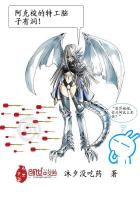Thus while the Trojan and Arcadian horse To Pallantean tow'rs direct their course, In long procession rank'd, the pious chief Stopp'd in the rear, and gave a vent to grief:
"The public care," he said, "which war attends, Diverts our present woes, at least suspends.
Peace with the manes of great Pallas dwell!
Hail, holy relics! and a last farewell!"
He said no more, but, inly thro' he mourn'd, Restrained his tears, and to the camp return'd.
Now suppliants, from Laurentum sent, demand A truce, with olive branches in their hand;Obtest his clemency, and from the plain Beg leave to draw the bodies of their slain.
They plead, that none those common rites deny To conquer'd foes that in fair battle die.
All cause of hate was ended in their death;Nor could he war with bodies void of breath.
A king, they hop'd, would hear a king's request, Whose son he once was call'd, and once his guest.
Their suit, which was too just to be denied, The hero grants, and farther thus replied:
"O Latian princes, how severe a fate In causeless quarrels has involv'd your state, And arm'd against an unoffending man, Who sought your friendship ere the war began!
You beg a truce, which I would gladly give, Not only for the slain, but those who live.
I came not hither but by Heav'n's command, And sent by fate to share the Latian land.
Nor wage I wars unjust: your king denied My proffer'd friendship, and my promis'd bride;Left me for Turnus.Turnus then should try His cause in arms, to conquer or to die.
My right and his are in dispute: the slain Fell without fault, our quarrel to maintain.
In equal arms let us alone contend;
And let him vanquish, whom his fates befriend.
This is the way (so tell him) to possess The royal virgin, and restore the peace.
Bear this message back, with ample leave, That your slain friends may fun'ral rites receive."Thus having said- th' embassadors, amaz'd, Stood mute a while, and on each other gaz'd.
Drances, their chief, who harbor'd in his breast Long hate to Turnus, as his foe profess'd, Broke silence first, and to the godlike man, With graceful action bowing, thus began:
"Auspicious prince, in arms a mighty name, But yet whose actions far transcend your fame;Would I your justice or your force express, Thought can but equal; and all words are less.
Your answer we shall thankfully relate, And favors granted to the Latian state.
If wish'd success our labor shall attend, Think peace concluded, and the king your friend:
Let Turnus leave the realm to your command, And seek alliance in some other land:
Build you the city which your fates assign;We shall be proud in the great work to join."Thus Drances; and his words so well persuade The rest impower'd, that soon a truce is made.
Twelve days the term allow'd: and, during those, Latians and Trojans, now no longer foes, Mix'd in the woods, for fun'ral piles prepare To fell the timber, and forget the war.
Loud axes thro' the groaning groves resound;Oak, mountain ash, and poplar spread the ground;First fall from high; and some the trunks receive In loaden wains; with wedges some they cleave.
And now the fatal news by Fame is blown Thro' the short circuit of th' Arcadian town, Of Pallas slain- by Fame, which just before His triumphs on distended pinions bore.
Rushing from out the gate, the people stand, Each with a fun'ral flambeau in his hand.
Wildly they stare, distracted with amaze:
The fields are lighten'd with a fiery blaze, That cast a sullen splendor on their friends, The marching troop which their dead prince attends.
Both parties meet: they raise a doleful cry;The matrons from the walls with shrieks reply, And their mix'd mourning rends the vaulted sky.
The town is fill'd with tumult and with tears, Till the loud clamors reach Evander's ears:
Forgetful of his state, he runs along, With a disorder'd pace, and cleaves the throng;Falls on the corpse; and groaning there he lies, With silent grief, that speaks but at his eyes.
Short sighs and sobs succeed; till sorrow breaks A passage, and at once he weeps and speaks:
"O Pallas! thou hast fail'd thy plighted word, To fight with caution, not to tempt the sword!
I warn'd thee, but in vain; for well I knew What perils youthful ardor would pursue, That boiling blood would carry thee too far, Young as thou wert in dangers, raw to war!
O curst essay of arms, disastrous doom, Prelude of bloody fields, and fights to come!
Hard elements of unauspicious war, Vain vows to Heav'n, and unavailing care!
Thrice happy thou, dear partner of my bed, Whose holy soul the stroke of Fortune fled, Praescious of ills, and leaving me behind, To drink the dregs of life by fate assign'd!
Beyond the goal of nature I have gone:
My Pallas late set out, but reach'd too soon.
If, for my league against th' Ausonian state, Amidst their weapons I had found my fate, (Deserv'd from them,) then I had been return'd A breathless victor, and my son had mourn'd.
Yet will I not my Trojan friend upbraid, Nor grudge th' alliance I so gladly made.
'T was not his fault, my Pallas fell so young, But my own crime, for having liv'd too long.
Yet, since the gods had destin'd him to die, At least he led the way to victory:
First for his friends he won the fatal shore, And sent whole herds of slaughter'd foes before;A death too great, too glorious to deplore.
Nor will I add new honors to thy grave, Content with those the Trojan hero gave:
That funeral pomp thy Phrygian friends design'd, In which the Tuscan chiefs and army join'd.
Great spoils and trophies, gain'd by thee, they bear:
Then let thy own achievements be thy share.
Even thou, O Turnus, hadst a trophy stood, Whose mighty trunk had better grac'd the wood, If Pallas had arriv'd, with equal length Of years, to match thy bulk with equal strength.
But why, unhappy man, dost thou detain These troops, to view the tears thou shedd'st in vain?
Go, friends, this message to your lord relate:
Tell him, that, if I bear my bitter fate, And, after Pallas' death, live ling'ring on, 'T is to behold his vengeance for my son.















